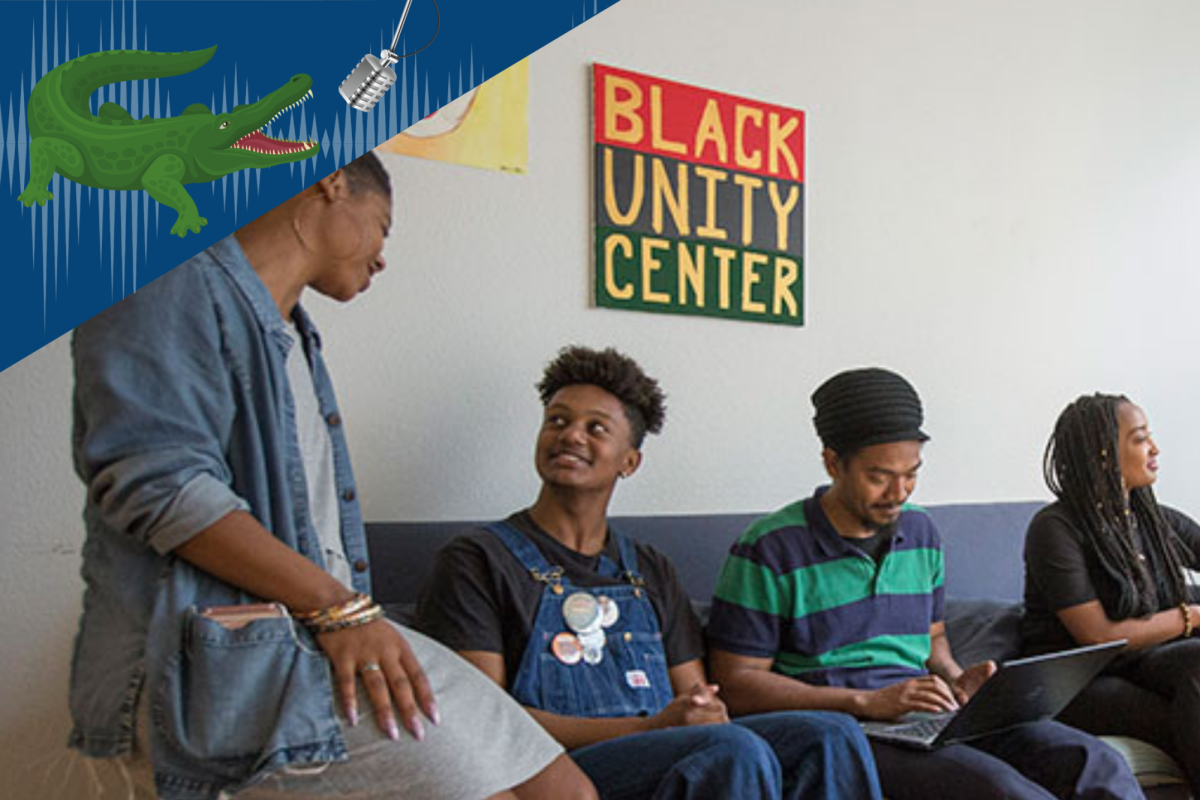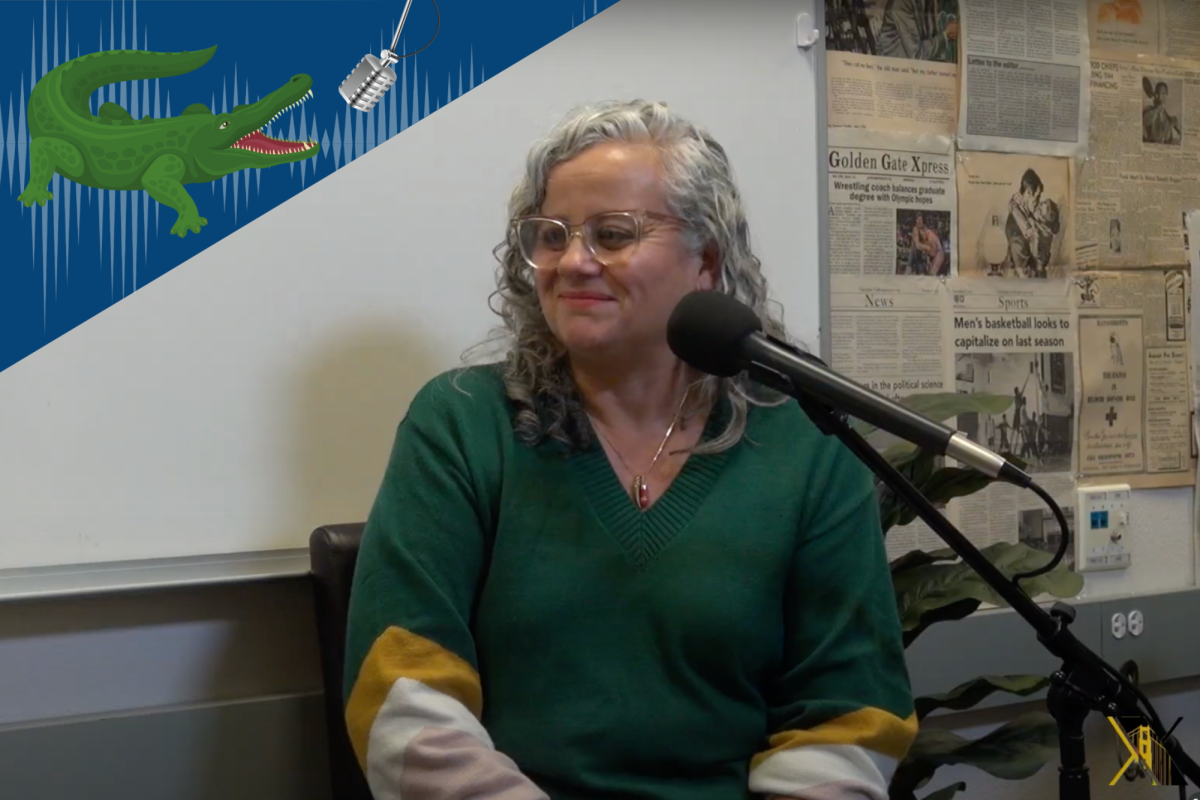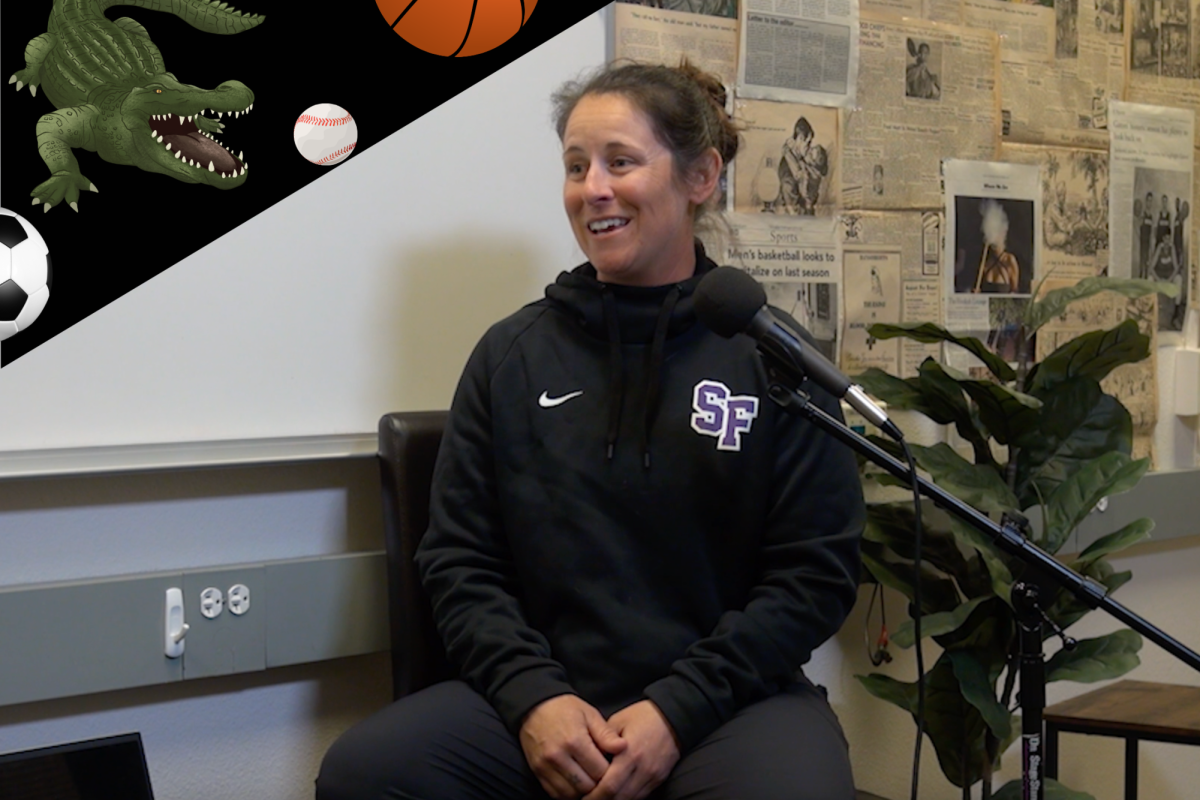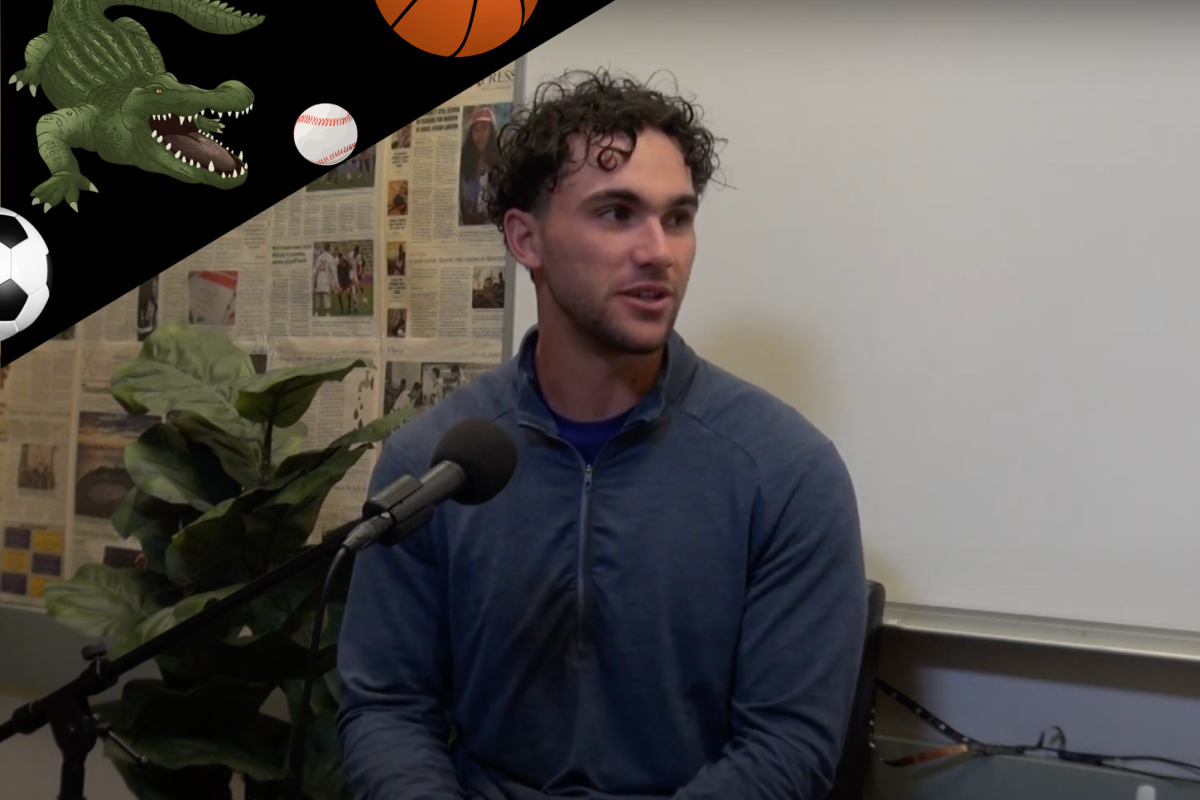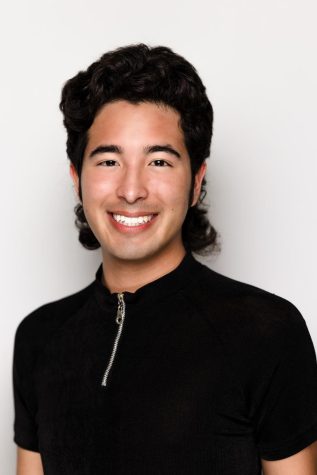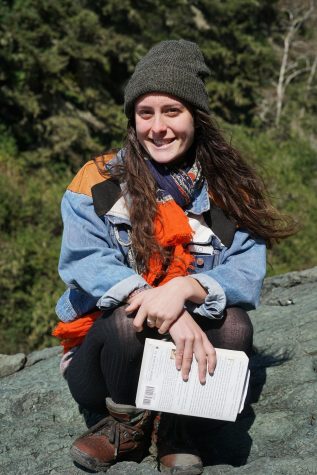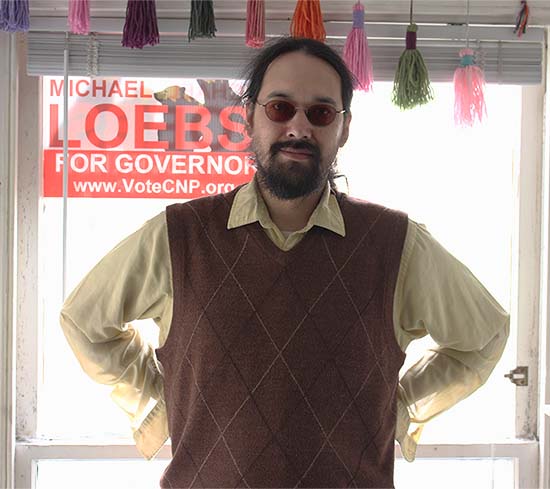
Welcome to Gator Talk, a collaborative CalState podcast that brings city and statewide perspectives to SF State news.
Seb is out this week so Co-host, Chris Ramirez, and guest host Eve DeBord, Campus Editor, sat down with SF State professor and California gubernatorial election candidate, Michael Loebs, to learn more about his platform with the California National Party.
Chris and Eve also asked about his proposed policies and what the state’s most pressing issue is, among other topics. Check out the story here at Gator Talk.
Intro
Chris: Happy Friday, everyone!
I’m Chris Ramirez, editor-in-chief and your co-host for Gator Talk, a Golden Gate Xpress podcast that brings news to SF State students.
Week three of the semester is just about done, and I’m definitely feeling it. Hang in there everyone, and just remember that while pain might be temporary, GPA is forever — no no no, I’m kidding!
Take care of yourself, and let’s try and enjoy our remaining days of summer.
Ready?
For more information/coverage, check out goldengatexpress.org OR @GatorTalkPod on all social media platforms.
Preview of the show
Chris: Here’s a quick preview of the show.
First, I’ll update you all with a quick news brief with news that happened this week that matters to SF State students.
Then, Xpress campus editor, Eve DeBord, is going to join me on the pod to talk about the recall election, with an emphasis on one candidate in particular.
Here’s the brief.
News brief
Chris:
Panama-flagged bulk carrier Coral Crystal became the second ship in the past six months on Thursday to get stuck in the Suez Canal — yikes. While officials had to redirect other vessels to another lane, they said that “traffic was not negatively impacted in anyway.” The ship is now free.
On Wednesday, Britney Spears’ father, Jamie Spears, filed to end the conservatorship his daughter has been placed under for the past 13 years. Jamie said in August that he planned on stepping down once a replacement conservator over the pop star’s finances could be identified. But this is the first time Jamie has said that the conservatorship should end, with his lawyer writing in the filing that “all he wants is what is best for his daughter.” If the filing is approved by a judge, Britney would become the second entity in our news brief to be freed — so fingers crossed?
According to a UC Berkeley Institute of Governmental Studies poll released on Friday, about 60% of likely voters oppose the recall of California Gov. Gavin Newson, with 38.5% for the call and 2% unsure or declining to answer. Voters you have until Tuesday to make a decision, so exercise that democratic right and get your ballots in!
Main Story
Chris: This upcoming Tuesday marks the official voting day for California’s gubernatorial recall election. It’s the second recall attempt to make it to the ballot in state history, following 2003’s recall election of Gray Davis, who was ultimately succeeded by Arnold Schwarzenegger. That election saw a total of 135 candidates running, including Arianna Huffington and former MLB Commissioner Peter Ueberroth.
This election only has a measly 46 candidates — psh, yeah right.
Eve: Hey everyone, my name is Eve DeBord, I’m Campus News Editor at Xpress. Chris, I do have one question: What does it take to run as a candidate?
Chris: Good question, Eve. The truth is, it’s really not that hard to apply to run.
Chris: According to the California Secretary of State website, there’s only three things a potential candidate has to do. With the elections commissioner of the county they are registered to vote in, candidates must:
- File a declaration of candidacy
- And file nomination papers with 65-100 valid nomination signatures
- And pay a roughly $4,200 filing fee, which may be waived in lieu of 7,000 signatures on the nomination papers
Chris: Write-in candidates have a different process, but with 46 replacement candidates, this sums up the experience for the people you’re seeing on the ballot, mostly Republican.
Eve: True, but not every candidate running to replace Newsom is a Republican. There’s a small handful of Democrats, and for others like Michael Loebs, running on an entirely different party.
Michael Loebs is a political science professor from SF State running in the recall election. He has no official party, but unofficially, he’s a part of the CNP — the California National Party.
[interview audio]
Michael Loebs: I’m chair of an organization called the California National Party, which has been working for the last five or six years to start a new political party here in California — one that is specifically California driven. It’s based on the philosophy that the two main federal parties, the Democrats and the Republicans, are basically having a battle 3,000 miles away in which we’re not really that involved.
[interview audio ends]
Chris: Wait, so why isn’t the CNP an official party?
Eve: The biggest hurdle for the CNP right now is that it needs numbers — in order to be an official party, it must have 0.33% of the state’s registered voters under that party’s name. And of California’s roughly 22 million voters, the CNP has somewhere between 500 and 600, as of this June.
Chris: Got it. And so Eve, remind me again, what does the CNP suggest to solve this red-blue binary issue that Michael Loebs mentioned?
Eve: Loebs and the CNP want California to become an independent entity from the U.S. He told us that under the current two-party system, Californians end up essentially getting screwed over regardless of the major party you may be registered to vote under.
Eve: If you’re a Republican or if you live in a rural area, your vote mostly doesn’t count because there’s an emphasis on large, urban, mostly liberal cities. And if you’re a Democrat, it makes it hard to hold elected officials accountable for their actions – or lack of action – because they sell themselves on the message that they deserve your vote simply because they’re not Republicans.
[interview audio]
Michael Loebs: We’ve come to determine that I have more in common with a Stacey Abrams voter in Georgia than I do with my neighbor who may happen to vote Republican — and perhaps in some ways you do. But talking with Democrats in Georgia or in Vermont, or Massachusetts, aren’t going to fix the problems of California. The only way we fix problems in California is by having Californians communicate with each other, and negotiate and discuss and compromise with each other and determine what works for us and what we need and why we want what we want and what we stand for.
[interview audio ends]
Eve: He also said that California politicians — his list includes VP Kamala Harris, Gov. Newsom, current AG Xavier Beccera, LA Mayor Eric Garcetti, and both House leaders Kevin McCarthy and Nancy Pelosi — also use the state as a stepping stone for larger jobs, typically at the federal level …
[interview audio]
Michael Loebs: … as if, like, California’s problems had been solved. And all these people can graduate on to the federal government now. No — I mean, they don’t care about California. They use California as a means to beef up their resume and get a better job at the federal government level. So I think here in California, we need to start thinking about voting for Californians who are going to stick it through.
[interview audio ends]
Chris: I know that the recall movement gained a lot of its momentum after Newsom was caught maskless and eating indoors at the French Laundry last November. Is that also what prompted Michael Loebs to run?
Eve: Actually, no. Loebs entered after the recall movement had begun. It was actually the way Democrats framed the recall that pushed him to apply. Democrats were actually comparing the recall movement to the Jan. 6 Capitol insurrection, something Loebs described as the Democrats’ entitlement of power.
[interview audio]
Michael Loebs: That to me was just like, ‘How far are we going to let Democrats push this? How far are we going to let Democrats in essence, push a narrative that the Democrats deserve and are entitled to power — because without us, the big bad Boogeyman of the Republican Party is going to come and destroy us all.’ It was the most absolute fear mongering message I’ve ever seen, that had no connection to reality at all.
[interview audio ends]
- Chris: We’re gonna take a quick break –
Break
Support the Golden Gate Xpress’ work by signing up for our online newsletter, following us on Instagram or Twitter @ GGXnews and visiting the website: https://goldengatexpress.org
Interested in advertising with GGX? Check out our advertising page on goldengatexpress.org/advertising.
- break ends –
Cont. Main Story
Eve: What would be the most pressing issue, if you could only choose one, for California right now?
[interview audio]
Michael Loebs: Right now, the most sort of existential issue for California is learning how to cope with what is now a completely predictable seasonal fire season. We have to accept that fire season in California for the foreseeable future is just like hurricane season if you live in Florida.
They tend to start in places within California that aren’t controlled by California. 45% of California is owned by the federal government. It’s public land that’s supposed to be administered by the Federal Bureau of Land Management. And by and large, these people just let the fires burn until they reach California territory. And then they say, ‘Okay, California, you deal with it.’
[interview audio ends]
Chris: Fourty-five percent — that’s a huge amount of California’s land. Is that true Eve?
Eve: It sure is. Actually to be more exact 47.7% of California’s land is owned by the federal government, over 45 million acres. A year ago Newsom’s administration partnered with the U.S. Forest Service, entering a commitment that the federal government would match California’s goal of reducing wildfire risks on 500,000 acres of forest land per year. However, according to the same document from Newsom’s office, experts advise at least 1 million acres of land be treated annually.
Chris: I wanted to go back to something you said earlier, which is the CNP’s idea of giving back authority to the counties. Would doing something like that possibly threaten state unity, and ultimately, the chance of Californians agreeing on wanting independence?
Eve: Totally, and Loebs actually said that he thinks the opposite would happen. Giving power to local governments would allow people to feel connected to the decisions affecting them directly, leaving things like civil rights or environmental policy to take place at the state level.
[interview audio]
Michael Loebs : I think we have to respect the size and diversity and complexity of California, and within the California National Party, that means a respect for greater local control and accountable representatives.
So I think actually one of the reasons why Californians feel so separated and alienated from each other is because so much is centrally done in Sacramento. Because if I live in the Sierra, if I live in Siskiyou, up in ‘State of Jefferson,’ I look at basically a government in Sacramento that is made up of power structures in the San Francisco Bay Area, Los Angeles, a little bit in San Diego, a little bit in Sacramento, but largely blue leaning or strongly blue urban areas.
[interview audio ends]
Chris: Wait a minute, the “State of Jefferson,” in California? What exactly does that mean?
Eve: Let me give you a brief rundown. Essentially the ‘State of Jefferson’ refers to a movement that goes way back, when a group of people living in rural southern Oregon and others in rural northern California proposed creating their own state. In 1852, the idea was first introduced to California’s congress and has been proposed since but has never come close to fruition.
However, this idea hasn’t died in many of these California counties which voted for Trump in 2020’s election. According to Politico, in both Modoc and Lassen county over 70% of the population voted for Trump.
[interview audio]
Michael Loebs: So if you have a policy that’s about every Californian should be automatically enrolled in Medical, everybody in California, if you’re a registered Californian has Medical, you have it if you need it. If in Berkeley you sell that as healthcare as a human right and if in Calaveras County, I sell it as: ‘Grandma shouldn’t die horribly from cancer just because she doesn’t have insurance,’ then that’s how I sell it. And we get the policy at the end that we can both agree on.
Universal basic income and negative income tax, which is a very big part of the CNP platform and my own gubernatorial platform — Let’s be honest, what is that functionally going to do? It’s going to take money from more wealthy, urban democratic voting parts of California and move it into rural California, move it into inland California where there tends to be a lower income level. UBI will actually help bring money into rural inland California.
[interview audio ends]
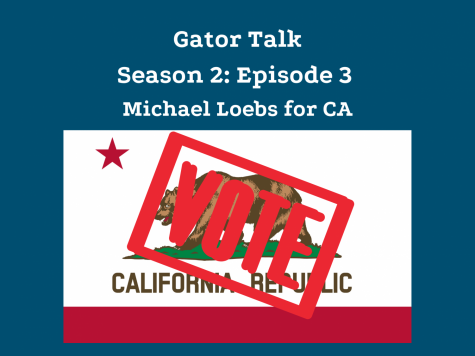
Chris: For context, the U.S. Census Bureau’s data from 2019 shows that the median household income in California was around $75,000. For San Francisco, Marin and San Mateo counties that number is over $100,000 but in Modoc, Del Norte and Tehama counties, the median income hovered around $45,000.
[interview audio]
Eve: What is the next step for the CNP? And then also, for you personally, should we be looking for your name on any local ballots anytime soon?
Michael Loebs: My immediate goals are the elections on the 14th, the 15th is Yom Kippur, so I’ll be dealing with that. And then from the 17th to 19th, I am not leaving my apartment and listening to a lot of Beatles and relaxing.
We’re going to be moving, obviously, almost immediately into the 2022 election cycle. I know we’ve got a few candidates we’re looking to endorse. We cannot run our own official candidates yet, because we’re not a qualified political party.
But at this point we’re looking for candidates to support and endorse in the 2022 run. That may or may not include me, it depends on how I’m feeling after a few days of hiding in my apartment listening to the Beatles and how tired I still am afterwards.
End
And that was the episode. This is Chris Ramirez, editor-in-chief and your co-host for Gator Talk.
New episodes will premiere Friday mornings, so stay tuned.
And with that, I’m out.







